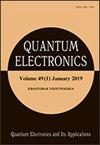1.54 μm微秒激光脉冲体外白内障摘除实验研究
IF 0.9
4区 工程技术
Q3 Engineering
引用次数: 1
摘要
利用1.54 μm Yb, Er:玻璃激光器产生微秒脉冲,首次实现了猪眼白内障模型的体外激光摘除。我们使用的有效脉冲重复率为36至75 Hz,平均激光输出功率为3.9至5.25 W。研究结果首次表明,在有效脉冲重复频率为45 Hz、脉冲重复频率为15 Hz、脉冲频率为3微秒、脉冲能量为260 ~ 265 mJ的条件下,白内障摘除的激光步长为130±10 s,与发射波长为1.44 μm的Nd: YAG激光超声超声乳化和激光摘除时间相当。利用Yb, Er:玻璃激光器产生的微秒脉冲爆发,对水与1.54 μm辐射相互作用的水声过程进行声学和高速视频记录,首次实现了在脉冲间隔减小到700 μs以下的脉冲爆发中探测水声过程重叠。在水声过程重叠的情况下,尽管平均功率和有效脉冲重复率增加,但由于脉冲通过水中形成的气泡传播,声波产生是无效的。在较低的平均功率、较低的有效脉冲重复率和850±10 μs的脉冲间隔下,激光白内障摘除效果最好。本文章由计算机程序翻译,如有差异,请以英文原文为准。
In vitro study of cataract extraction by bursts of microsecond 1.54-μm laser pulses
Laser extraction of a model porcine eye cataract has been performed for the first time in an in vitro experiment using a 1.54-μm Yb, Er : glass laser generating bursts of microsecond pulses. We used effective pulse repetition rates from 36 to 75 Hz and average laser output powers from 3.9 to 5.25 W. The results demonstrate for the first time that, at an effective pulse repetition rate of 45 Hz, burst repetition rate of 15 Hz, three microsecond pulses per burst, and a burst energy from 260 to 265 mJ, the laser step duration in cataract extraction is 130 ± 10 s, which is comparable to the ultrasonic phacoemulsification and laser extraction time in the case of a Nd : YAG laser emitting at 1.44 μm. Acoustometry and high speed video recording of hydroacoustic processes accompanying interaction of water with 1.54-μm radiation from the Yb, Er : glass laser generating bursts of microsecond pulses have made it possible for the first time to detect overlap of hydroacoustic processes at the pulse spacing in bursts reduced to under 700 μs. In the case of overlap of hydroacoustic processes, despite the increase in average power and effective pulse repetition rate, acoustic wave generation is ineffective because pulses propagate through bubbles formed in the water. Laser cataract extraction is shown to be most effective at a lower average power, lower effective pulse repetition rate, and burst pulse spacing of 850 ± 10 μs.
求助全文
通过发布文献求助,成功后即可免费获取论文全文。
去求助
来源期刊

Quantum Electronics
工程技术-工程:电子与电气
CiteScore
3.00
自引率
11.10%
发文量
95
审稿时长
3-6 weeks
期刊介绍:
Quantum Electronics covers the following principal headings
Letters
Lasers
Active Media
Interaction of Laser Radiation with Matter
Laser Plasma
Nonlinear Optical Phenomena
Nanotechnologies
Quantum Electronic Devices
Optical Processing of Information
Fiber and Integrated Optics
Laser Applications in Technology and Metrology, Biology and Medicine.
 求助内容:
求助内容: 应助结果提醒方式:
应助结果提醒方式:


